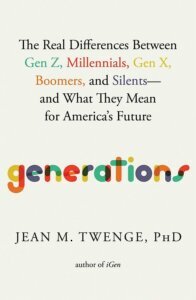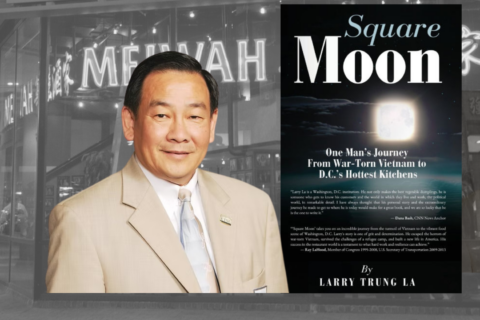This story was written as part of the WTOP Book Report series authored by Terik King. Read more of that coverage.
In her latest groundbreaking work, “Generations: The Real Differences Between Gen Z, Millennials, Gen X, Boomers, and Silents — and What They Mean for America’s Future,” acclaimed author and psychology professor Jean M. Twenge, Ph.D., takes readers on a data-driven deep dive into the tapestry of American society, exploring the connections, conflicts and commonalities among the six generations currently dominating American culture.
Twenge, known for her insightful exploration of generational trends in previous works such as “Generation Me” and “iGen,” embarks on a quest to unravel the complexities of each generation’s beliefs, behaviors and values.
Drawing on extensive research and utilizing vast government-funded surveys and databases, Twenge examines the impact of historical events, technological advancements and cultural shifts on shaping the unique identities of the Silents (1925-1945), Baby Boomers (1946-1964), Generation X (1965-1979), Millennials (1980-1999), Generation Z (1995-2013) and Generation Alpha (2014 onward) — whom she refers to as “Polars … after melting polar ice caps and political polarization; we’ll see what they end up being called.”
“For me, the biggest thing is to try to understand each other’s perspectives as people who are born at different times and thus have had very different experiences,” Twenge told the WTOP Book Report, “I think the best way to do that is to go straight to the source … we’re in the age of Big Data; we don’t need to make guesses anymore about what the generational differences are.”

For “Generations,” Twenge relies on extensive data sources, comprising 24 databases representing a staggering 39 million participants. These nationally representative surveys cover an array of topics, from mental health and political attitudes to values and societal changes.
Twenge’s meticulous analysis seeks to dispel any skepticism regarding the validity of generalizing entire groups of people based on birth years.
In addressing such skepticism, Twenge acknowledges the artificial nature of grouping individuals but argues it is a common, human practice.
“Humans do that all the time. We classify people by where they’re from by age group, you know, we talk about teenagers, like, they’re a monolithic group. But … of course, they’re not,” she explained. “There is a lot of speculation around generations … but we don’t need to do that anymore. We can use real data.”
The impact of tech
A key aspect of Twenge’s analysis involves the roles that technology and the so-called “slow life strategy” play in shaping generational dynamics.
Beyond smartphones and the internet, Twenge highlights the broader impact of technology, including early household appliances, transportation and medical advancements.
“Because of better medical care … our life spans are much longer than they used to be,” Twenge said. “So that means the developmental trajectory has slowed down every stage of life; we live more years of life, and so we take longer at each stage. It’s why 50 is the ‘new 40’ and 60 is the ‘new 50.’”
According to Twenge, technology not only influences the pace of life but also drives the way generations differ along the continuum — the shift from collectivism to individualism is among the themes explored throughout the book.
Twenge devotes significant attention to each generation, offering insights into the political shifts, economic challenges and cultural influences that define experiences. From the activism of the Silents to the rapid political evolution of the Baby Boomers and the resilience of Generation X, each generation’s story unfolds against the backdrop of their unique circumstances.
The interview delves into the specifics of certain generations, such as the defining characteristics of Millennials and the impact of technology on Generation Z.
One of the most pressing issues explored is the mental health crisis among Generation Z, with Twenge citing alarming statistics of doubled clinical depression rates among teens from 2011 to 2019.
Twenge’s research attributes this crisis to the direct and indirect effects of technology, including social media use, decreased face-to-face interactions and disrupted sleep patterns.
“Generations” is a deeply-researched tome not intended to be read linearly, like a story, but rather as a comprehensive resource to be revisited and explored based on individual interests and curiosities.
“[If] you want to start with your generation, or start with your kids’ generation, you can do that,” Twenge said. “If you want to start by just flipping through and looking at the graphs …. at the beginning of each chapter, I have famous people in the generations you can look at and go ‘I remember that show! I used to watch that when I was a kid.’ You can have fun with it.”.
In conclusion, Twenge’s “Generations” promises to reshape the way readers view their parents, peers, co-workers and children. By weaving together the threads of history, technology and cultural evolution, Twenge offers a compelling narrative that not only defines each generation but also elucidates the intricate web of connections that bind them across time.
Get breaking news and daily headlines delivered to your email inbox by signing up here.
© 2024 WTOP. All Rights Reserved. This website is not intended for users located within the European Economic Area.








